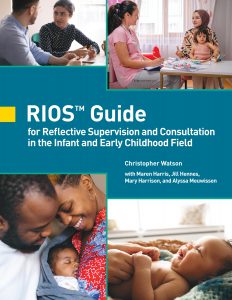A groundbreaking new book by CEED’s Christopher Watson, PhD, Alyssa Meuwissen, PhD, and colleagues, is the first guide to using the Reflective Interaction Observation Scale (RIOS™) as a framework to plan and shape reflective supervision sessions. Entitled RIOS™Guide for Reflective Supervision and Consultation in the Infant and Early Childhood Field, the book is out now from Zero to Three.
The origin of the RIOS™
The RIOS™ was initially developed as a research tool. Its purpose is to help researchers identify and measure the “active ingredients” in a reflective supervision session. Researchers who study reflective supervision may watch video recordings of reflective supervision sessions to determine how and why this practice works. The RIOS™ organizes the processes involved in reflective supervision into a framework. Within the framework, these processes fall into two categories: Essential Elements and Collaborative Tasks. Using the RIOS™, researchers can catalog and assign numerical values to the Essential Elements and Collaborative Tasks that they observe in recorded reflective supervision sessions. This process, called “coding,” is one of the ways in which social scientists collect quantitative data about practices like reflective supervision.
Watson, who retired as director of CEED’s Reflective Practice Center in 2021, led the development of the RIOS™. In 2010, he joined a group of researchers and practitioners from the Alliance for the Advancement of Infant Mental Health who came together to gather data about reflective supervision. Over the course of the following eight years, Watson headed up the effort to turn that raw information into a useful tool.
“A smaller group of us met once a month online to try to further distill the data that we had started with, operationalize it, and fill it out,” he says.
Watson and his colleagues were fascinated to find that the RIOS™ quickly proved useful not just to researchers, but to practitioners of reflective supervision and others in the field.
“People immediately grabbed onto it as a way to explain reflective supervision when training both supervisors and supervisees,” Watson recalls. “And supervisors began using it both prior to a reflective supervision session, to remind them of what they wanted to address in the session, as well as following a session, to review what occurred and to determine what they wanted to pursue in future sessions. It became a natural outgrowth.”
With this use of the RIOS™ in mind, Watson and his coauthors included a one-page “Self Check” form in the RIOS™ Guide, which enables reflective supervisors to quickly document the content and process of the session and to record notes for the next session.
“‘Guide’ is the perfect word for it”
Work continued on developing the RIOS™ for research purposes, and Watson and colleagues created a RIOS™ Manual to train researchers in the use of the tool for coding. However, nothing similar existed for those who had adopted the RIOS for use in the field until now. Watson recalls that careful thought was put into choosing a title for the new book.
“Reflective supervision is not a manualized process; it’s the antithesis of that,” he says. “A manual is prescriptive. It trains people to do the same things. The RIOS™Guide is the opposite of that approach.”
“’Guide’ is the perfect word for it,” agrees Deborah Ottman, CEED’s professional development coordinator. Along with Meredith Reese, research assistant at CEED, Ottman was instrumental in preparing the RIOS™Guide for publication. “It’s a roadmap that offers you a million different paths to the same destination: the child. And you can choose different paths on different days.”
For those who are providing or preparing to provide reflective supervision, CEED offers two online classes on the RIOS™: RIOS™ 1: Using the RIOS™ Framework for Reflective Supervision and RIOS™ 2: Advanced Reflective Supervision. We also offer 10 self-study modules exploring different aspects of reflective supervision.




